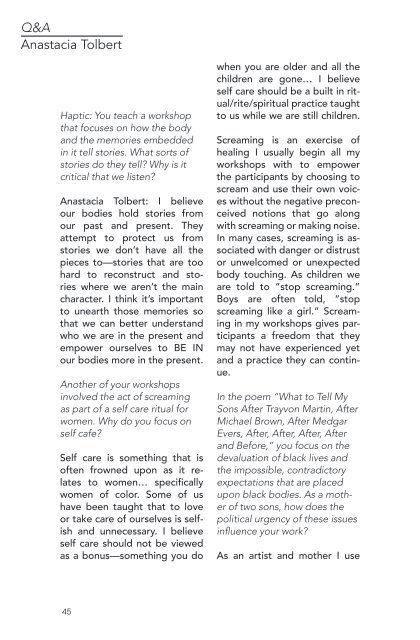Create successful ePaper yourself
Turn your PDF publications into a flip-book with our unique Google optimized e-Paper software.
Q&A<br />
Anastacia Tolbert<br />
Haptic: You teach a workshop<br />
that focuses on how the body<br />
and the memories embedded<br />
in it tell stories. What sorts of<br />
stories do they tell? Why is it<br />
critical that we listen?<br />
Anastacia Tolbert: I believe<br />
our bodies hold stories from<br />
our past and present. They<br />
attempt to protect us from<br />
stories we don’t have all the<br />
pieces to—stories that are too<br />
hard to reconstruct and stories<br />
where we aren’t the main<br />
character. I think it’s important<br />
to unearth those memories so<br />
that we can better understand<br />
who we are in the present and<br />
empower ourselves to BE IN<br />
our bodies more in the present.<br />
Another of your workshops<br />
involved the act of screaming<br />
as part of a self care ritual for<br />
women. Why do you focus on<br />
self cafe?<br />
Self care is something that is<br />
often frowned upon as it relates<br />
to women… specifically<br />
women of color. Some of us<br />
have been taught that to love<br />
or take care of ourselves is selfish<br />
and unnecessary. I believe<br />
self care should not be viewed<br />
as a bonus—something you do<br />
when you are older and all the<br />
children are gone… I believe<br />
self care should be a built in ritual/rite/spiritual<br />
practice taught<br />
to us while we are still children.<br />
Screaming is an exercise of<br />
healing I usually begin all my<br />
workshops with to empower<br />
the participants by choosing to<br />
scream and use their own voices<br />
without the negative preconceived<br />
notions that go along<br />
with screaming or making noise.<br />
In many cases, screaming is associated<br />
with danger or distrust<br />
or unwelcomed or unexpected<br />
body touching. As children we<br />
are told to “stop screaming.”<br />
Boys are often told, “stop<br />
screaming like a girl.” Screaming<br />
in my workshops gives participants<br />
a freedom that they<br />
may not have experienced yet<br />
and a practice they can continue.<br />
In the poem “What to Tell My<br />
Sons After Trayvon Martin, After<br />
Michael Brown, After Medgar<br />
Evers, After, After, After, After<br />
and Before,” you focus on the<br />
devaluation of black lives and<br />
the impossible, contradictory<br />
expectations that are placed<br />
upon black bodies. As a mother<br />
of two sons, how does the<br />
political urgency of these issues<br />
influence your work?<br />
As an artist and mother I use<br />
45



